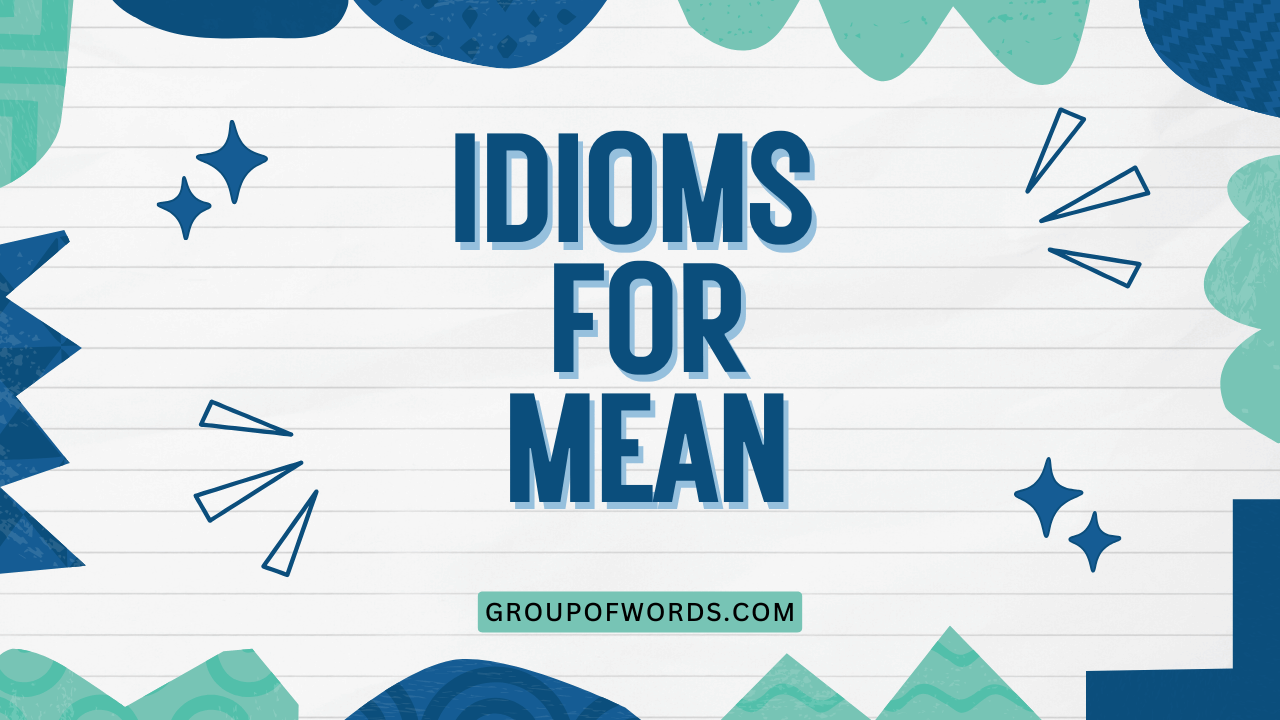Mastering English: Idioms for “Mean” – A Comprehensive Guide
Understanding idioms is crucial for mastering the English language. Idioms add color, depth, and nuance to our communication, allowing us to express ourselves more vividly and connect with others on a deeper level.
This article focuses on idioms that convey the concept of “mean,” covering a range of meanings from unkindness to significance. Whether you’re an ESL student, a seasoned writer, or simply someone looking to improve your English proficiency, this guide will provide you with the knowledge and practice you need to confidently use these idioms in your everyday conversations and writing.
This comprehensive guide explores various idioms related to the concept of “mean,” providing clear definitions, illustrative examples, and practical exercises. By the end of this article, you’ll be well-equipped to recognize and use these idioms effectively, enhancing your understanding of English and your ability to communicate with greater precision and flair.
Table of Contents
- Definition of “Mean” and Idioms
- Structural Breakdown of Idioms
- Types and Categories of Idioms for “Mean”
- Examples of Idioms for “Mean”
- Usage Rules for Idioms
- Common Mistakes with Idioms
- Practice Exercises
- Advanced Topics
- Frequently Asked Questions
- Conclusion
Definition of “Mean” and Idioms
The word “mean” has several meanings in English, ranging from unkindness and cruelty to significance, intention, and average. An idiom is a phrase or expression whose meaning cannot be understood from the ordinary meanings of the words within it. Idioms are culturally specific and add depth and color to the English language. Understanding idioms is essential for both comprehending and effectively using the language.
For example, the idiom “to be mean spirited” describes someone who is deliberately unkind or nasty. This phrase doesn’t literally mean that the person’s spirit is mean; it’s a figurative expression. Similarly, “to mean business” suggests someone is serious and determined, not that they literally signify transactions.
Idioms are classified as a type of figurative language. Their function is to convey a meaning beyond the literal definition of the words used.
They are often used to add emphasis, humor, or a sense of informality to communication. Idioms are essential in everyday conversation, literature, and various forms of media.
Structural Breakdown of Idioms
Idioms, by their nature, defy a strict structural breakdown in the same way as traditional grammar. They are fixed expressions, and their meaning is derived from the phrase as a whole, rather than the individual words.
However, understanding the typical structures within which idioms appear can be helpful.
Most idioms consist of a combination of nouns, verbs, adjectives, and prepositions. The arrangement of these elements is fixed, and changing the order or substituting words usually destroys the idiom’s meaning. For example, “to mean well” consists of the verb “mean” and the adverb “well.” Rearranging it to “well to mean” makes no sense.
Some idioms are verb phrases, such as “mean to do something” or “didn’t mean to.” These idioms often involve auxiliary verbs and infinitives. Other idioms may be prepositional phrases, like “by all means” (meaning certainly or definitely). Recognizing these structural patterns can aid in identifying and understanding idioms when you encounter them.
Many idioms follow common grammatical patterns, even if their meaning is not literal. For example, idioms with verbs often conjugate normally: “He means well,” “They meant no harm.” Understanding these patterns can help you use idioms correctly in different tenses and contexts.
Types and Categories of Idioms for “Mean”
Idioms related to “mean” can be broadly categorized based on the specific meaning they convey. Here are the main categories:
Idioms for Unkindness or Cruelty
These idioms describe behavior or attitudes that are deliberately hurtful or unpleasant. They often involve expressions of malice, spite, or lack of empathy.
These are critical for understanding interpersonal dynamics and the nuances of negative behavior.
Idioms for Significance or Importance
These idioms emphasize the importance or relevance of something. They indicate that something has a particular value or consequence.
They are vital for highlighting key points or emphasizing the impact of events.
Idioms for Intention or Purpose
These idioms express someone’s aim, objective, or plan. They indicate what someone intends to do or achieve.
They are useful for discussing goals, motivations, and plans.
Idioms for Average or Typical
Although less common, some idioms relate to “mean” as in “average.” These idioms describe what is typical or representative. They are helpful for discussing statistics, trends, and general patterns.
Examples of Idioms for “Mean”
This section provides extensive examples of idioms related to “mean,” organized by category. Each example includes the idiom, its meaning, and a sentence illustrating its use.
Understanding these examples will significantly enhance your ability to recognize and use these idioms in various contexts.
Examples of Idioms for Unkindness
The following table provides multiple examples of idioms that convey unkindness or cruelty. Understanding these idioms can help you recognize and describe situations where someone is acting mean or malicious.
| Idiom | Meaning | Example Sentence |
|---|---|---|
| Mean-spirited | Having or showing a lack of generosity; petty. | His mean-spirited comments ruined the celebratory mood. |
| Below the belt | Unfair or unsportsmanlike. | Bringing up his personal problems during the debate was below the belt. |
| Kick someone when they’re down | To take advantage of someone’s misfortune. | It’s not right to kick someone when they’re down; offer them support instead. |
| Rub salt in the wound | To make a painful situation worse. | By constantly reminding her of her failure, he was just rubbing salt in the wound. |
| Have a heart of stone | To be unfeeling or unsympathetic. | You’d have to have a heart of stone not to feel sorry for the homeless. |
| A slap in the face | An insult or rejection. | Being passed over for the promotion felt like a slap in the face. |
| Twist the knife | To deliberately make someone feel worse. | He didn’t just fire her; he twisted the knife by saying she was incompetent. |
| A cold shoulder | To deliberately ignore someone. | She gave him the cold shoulder after their argument. |
| Look down on someone | To consider someone inferior. | He looks down on anyone who didn’t attend an Ivy League school. |
| Be a thorn in someone’s side | To be a constant source of annoyance. | His constant complaining was a thorn in my side. |
| Give someone a taste of their own medicine | To treat someone the way they have treated you. | She decided to give him a taste of his own medicine by ignoring him. |
| Have it in for someone | To be determined to cause trouble for someone. | The boss seems to have it in for me; he’s always criticizing my work. |
| A backhanded compliment | An insult disguised as a compliment. | “That dress is nice, considering where you bought it” is a backhanded compliment. |
| To be catty | To be deliberately unkind in remarks, often about other women. | The office environment became toxic with the catty comments being exchanged. |
| To be a snake in the grass | To be a treacherous or deceitful person. | I thought he was my friend, but he turned out to be a snake in the grass. |
| To stab someone in the back | To betray someone’s trust. | He stabbed me in the back by telling the boss my secrets. |
| To talk behind someone’s back | To say negative things about someone when they’re not present. | It’s not fair to talk behind her back; if you have a problem, speak to her directly. |
| To be cruel to be kind | To do something that seems unkind but is ultimately for someone’s benefit. | Sometimes parents have to be cruel to be kind to teach their children important lessons. |
| To have a short fuse | To get angry easily. | He has a short fuse and often overreacts to minor issues. |
| To pick on someone | To bully or harass someone repeatedly. | The older boys picked on the younger ones during recess. |
| To give someone the third degree | To interrogate someone intensely. | The police gave him the third degree, trying to get him to confess. |
Examples of Idioms for Significance
The table below presents idioms that highlight the significance or importance of something. These idioms help convey the weight or impact of a situation or event.
| Idiom | Meaning | Example Sentence |
|---|---|---|
| Mean the world to someone | To be very important to someone. | My family means the world to me. |
| Make a difference | To have a significant effect. | Volunteering can make a difference in someone’s life. |
| Carry weight | To be influential or important. | His opinion carries a lot of weight in the company. |
| Hold water | To be logical or consistent; to stand up to scrutiny. | His explanation doesn’t hold water; it doesn’t make sense. |
| Of great consequence | Very important or significant. | The decision was of great consequence for the future of the company. |
| Be a big deal | To be important or significant. | Winning the championship was a big deal for the team. |
| Matter a great deal | To be very important. | Your support matters a great deal to me. |
| To be crucial | To be extremely important or necessary. | It is crucial that we finish the project on time. |
| To be paramount | To be of utmost importance. | Safety is paramount in this industry. |
| To be vital | To be essential or necessary for life. | Water is vital for human survival. |
| To be essential | To be absolutely necessary. | Good communication is essential for a successful relationship. |
| To be key | To be the most important factor. | Teamwork is key to achieving our goals. |
| To be significant | To be important and deserving of attention. | The discovery of the new species is significant for the scientific community. |
| To bear significance | To have importance or meaning. | The event bears great significance in the history of the nation. |
| To be substantial | To be of considerable importance, size, or worth. | The company made a substantial profit this year. |
| To be compelling | To be forceful and convincing. | The evidence presented was compelling enough to win the case. |
| To be telling | To be revealing or significant. | His silence was telling; it showed he knew more than he admitted. |
| To be momentous | To be of great importance or significance, especially in its bearing on the future. | The signing of the peace treaty was a momentous occasion. |
| To be consequential | To be important; significant; of consequence. | The decision to invest in new technology was consequential for the company’s growth. |
| To be noteworthy | To be deserving attention because of being important or interesting. | His achievements are noteworthy and deserve recognition. |
| To cut no ice | To fail to impress or influence someone. | His excuses cut no ice with the manager, who demanded an explanation. |
| To be a watershed moment | A turning point; a moment that marks a change of course. | The invention of the internet was a watershed moment in human history. |
Examples of Idioms for Intention
The following table provides examples of idioms that express intention or purpose. Understanding these idioms can help you articulate what someone plans to do or achieve.
| Idiom | Meaning | Example Sentence |
|---|---|---|
| Mean to do something | To intend to do something. | I meant to call you yesterday, but I got busy. |
| Set out to do something | To begin or start with a specific intention. | She set out to become a doctor and worked hard to achieve her goal. |
| Aim to do something | To intend to achieve something. | We aim to provide the best customer service possible. |
| Intend to do something | To have a plan or purpose in mind. | I intend to finish this project by the end of the week. |
| Be bent on doing something | To be determined to do something, often against opposition. | He is bent on proving everyone wrong. |
| Have in mind | To be thinking of something as a plan or intention. | I have in mind a vacation to Hawaii next year. |
| Have every intention of | To be fully determined to do something. | I have every intention of paying you back as soon as I can. |
| Be out to do something | To be trying to achieve something, often in a competitive way. | He is out to win the election at any cost. |
| Be after something | To be trying to obtain something. | What are you after? I know you didn’t come here just to chat. |
| To be resolved to do something | To be firmly determined to do something. | She is resolved to lose weight and get healthy. |
| To aspire to | To have a strong desire to achieve something. | He aspires to become a successful entrepreneur. |
| To have designs on something | To have a secret plan to obtain something, especially power or position. | She has designs on the manager’s job. |
| To look forward to | To anticipate with pleasure. | I look forward to seeing you again soon. |
| To have a mind to do something | To feel inclined to do something. | I have a mind to take a walk in the park. |
| To plan on doing something | To intend to do something. | We plan on visiting Europe next summer. |
| To set one’s sights on something | To decide to achieve something. | She set her sights on getting into Harvard. |
| To have a goal in mind | To have a clear objective to achieve. | He has a goal in mind to become a millionaire by age 30. |
| To be hell-bent on | To be recklessly determined to do something. | He is hell-bent on destroying his career with his reckless behavior. |
| To be driven to | To be compelled or motivated to do something. | She is driven to succeed, no matter the obstacles. |
| To be aiming for | To be working towards a specific goal. | The company is aiming for a 20% increase in sales this year. |
| To contemplate doing something | To consider doing something. | I contemplate doing a master’s degree in the future. |
| To be looking to | To be planning or intending to do something. | We are looking to expand our business into new markets. |
Examples of Idioms for Average
While less common, some idioms touch upon the concept of “mean” as in “average.” These idioms describe what is typical or representative.
| Idiom | Meaning | Example Sentence |
|---|---|---|
| The average Joe | A typical or ordinary person. | He’s just the average Joe, nothing special about him. |
| Par for the course | What is normal or expected in a given situation. | The flight delay was par for the course when traveling during the holidays. |
| Middle-of-the-road | Moderate; not extreme. | The politician took a middle-of-the-road approach to the controversial issue. |
| Run-of-the-mill | Ordinary; not special or exciting. | The restaurant was run-of-the-mill, nothing to write home about. |
| Nothing to write home about | Not particularly special or exciting. | The movie was alright, but nothing to write home about. |
| Within reason | Within reasonable limits. | You can ask for anything you want, within reason. |
| The norm | The usual, typical, or standard thing. | Wearing a suit to work is the norm in this office. |
| Status quo | The existing state of affairs. | The company is resistant to change and prefers to maintain the status quo. |
| In the mainstream | Reflecting the common values and attitudes of society. | Her music has become more in the mainstream over the years. |
| A dime a dozen | Very common and easy to find. | Those kinds of smartphones are a dime a dozen these days. |
Usage Rules for Idioms
Using idioms correctly requires understanding their specific meanings and contexts. Here are some general rules to follow:
- Learn the meaning: Always ensure you know the accurate meaning of an idiom before using it. Misusing an idiom can lead to confusion or miscommunication.
- Consider the context: Idioms are often informal and may not be appropriate in formal settings. Choose idioms that fit the tone and audience.
- Use them naturally: Incorporate idioms smoothly into your speech or writing. Avoid forcing them into sentences where they don’t fit.
- Don’t change them: Idioms are fixed expressions. Changing the words or word order can alter the meaning or make the idiom nonsensical.
- Be aware of cultural differences: Idioms are often culturally specific. What is common in one culture may be unfamiliar or confusing in another.
Pay attention to how native speakers use idioms in conversation and writing. This will help you develop a feel for their appropriate usage and context.
Reading books, watching movies, and listening to podcasts are excellent ways to immerse yourself in the language and learn idioms naturally.
Common Mistakes with Idioms
Many learners make common mistakes when using idioms. Being aware of these errors can help you avoid them.
| Incorrect | Correct | Explanation |
|---|---|---|
| He means me the world. | He means the world to me. | Incorrect word order. The correct idiom is “mean the world to someone.” |
| They kicked him when he was up. | They kicked him when he was down. | Incorrect word choice. The correct idiom is “kick someone when they’re down.” |
| She rubbed pepper in the wound. | She rubbed salt in the wound. | Incorrect word choice. The correct idiom is “rub salt in the wound.” |
| His opinion carries a lot of weightlift. | His opinion carries a lot of weight. | Incorrect word choice. The correct idiom is “carry weight.” |
| I mean call you yesterday. | I meant to call you yesterday. | Grammatical error. The correct idiom is “meant to do something.” |
| He is bent to prove everyone wrong. | He is bent on proving everyone wrong. | Incorrect preposition. The correct idiom is “bent on doing something.” |
| I have in my mind a vacation. | I have in mind a vacation. | Unnecessary word. The correct idiom is “have in mind.” |
| She setting her sights to getting into Harvard. | She set her sights on getting into Harvard. | Incorrect tense and preposition. The correct idiom is “set one’s sights on something.” |
| That smartphone is a dollar a dozen. | That smartphone is a dime a dozen. | Incorrect word choice. The correct idiom is “a dime a dozen.” |
| He gave me a warm shoulder. | He gave me a cold shoulder. | Incorrect adjective. The correct idiom is “give someone the cold shoulder.” |
By paying attention to these common mistakes and practicing regularly, you can improve your accuracy and confidence in using idioms.
Practice Exercises
Test your understanding of idioms by completing the following exercises.
Exercise 1: Fill in the blanks with the correct idiom. Choose from the list below.
Idiom List: mean the world to me, below the belt, kick someone when they’re down, rub salt in the wound, heart of stone, a slap in the face, twist the knife, cold shoulder, look down on, thorn in my side
| Question | Answer |
|---|---|
| 1. My family __________. | My family mean the world to me. |
| 2. Criticizing his appearance was __________. | Criticizing his appearance was below the belt. |
| 3. It’s wrong to __________; offer them help instead. | It’s wrong to kick someone when they’re down; offer them help instead. |
| 4. He __________ by constantly reminding her of her failures. | He rubbed salt in the wound by constantly reminding her of her failures. |
| 5. You’d have to have a __________ not to feel sympathy. | You’d have to have a heart of stone not to feel sympathy. |
| 6. Being rejected from the university felt like __________. | Being rejected from the university felt like a slap in the face. |
| 7. He didn’t just fire her; he __________ by criticizing her work ethic. | He didn’t just fire her; he twisted the knife by criticizing her work ethic. |
| 8. She gave him the __________ after their fight. | She gave him the cold shoulder after their fight. |
| 9. He __________ anyone who didn’t go to a prestigious school. | He looks down on anyone who didn’t go to a prestigious school. |
| 10. His constant complaining was a __________. | His constant complaining was a thorn in my side. |
Exercise 2: Choose the correct idiom to complete the sentence.
| Question | Options | Answer |
|---|---|---|
| 1. He __________ to call, but he forgot. | (a) meant calling (b) meant to call (c) meaning to call | (b) meant to call |
| 2. Her opinion __________ in the committee. | (a) carries weight (b) carries heavy (c) carries a lot | (a) carries weight |
| 3. Volunteering can __________ in the community. | (a) make a different (b) make difference (c) make a difference | (c) make a difference |
| 4. His story didn’t __________. | (a) hold water (b) hold the water (c) hold waters | (a) hold water |
| 5. The project is __________ to the company’s success. | (a) key (b) a key (c) the key | (a) key |
| 6. The flight delay was __________ when flying during peak season. | (a) standard for the course (b) par for the course (c) norm for the course | (b) par for the course |
| 7. He is __________ getting his degree this year. | (a) aiming to (b) aiming on (c) aiming at | (a) aiming to |
| 8. They __________ him after he lost his job. | (a) gave the knife a twist (b) twisted the knife (c) twist the knife | (b) twisted the knife |
| 9. I __________ her. She’s always causing trouble. | (a) have it at (b) have it in (c) have it on | (b) have it in |
| 10. He is just __________, nothing special about him. | (a) the average John (b) the average Joe (c) the average Jack | (b) the average Joe |
Exercise 3: Rewrite the following sentences using an idiom from the article.
| Question | Answer |
|---|---|
| 1. My parents are very important to me. | My parents mean the world to me. |
| 2. He is determined to succeed, no matter what. | He is bent on succeeding, no matter what. |
| 3. She is planning to travel to Europe next summer. | She plans on traveling to Europe next summer. |
| 4. His rude comments were unfair and hurtful. | His rude comments were below the belt. |
| 5. He always criticizes me, which annoys me. | He is a thorn in my side. |
| 6. The company needs to maintain the current situation. | The company needs to maintain the status quo. |
| 7. She betrayed my trust by telling my secrets. | She stabbed me in the back by telling my secrets. |
| 8. He is very determined to win the competition. | He is hell-bent on winning the competition. |
| 9. It is very important that we finish the project on time. | It is crucial that we finish the project on time. |
| 10. His silence suggested he knew more than he was saying. | His silence was telling; it showed he knew more than he admitted. |
Advanced Topics
For advanced learners, exploring the etymology and historical context of idioms can provide a deeper understanding of their meanings and usage. Many idioms have fascinating origins rooted in historical events, cultural practices, or literary works.
For example, the idiom “kick the bucket” (to die) is believed to have originated from the practice of hanging animals for slaughter, where they would kick a bucket before dying.
Additionally, advanced learners can explore the use of idioms in different registers and genres of English. Idioms are more common in informal speech and writing but can also be used effectively in formal contexts to add emphasis or color.
Analyzing how idioms are used in literature, journalism, and other forms of media can enhance your understanding of their nuances and stylistic effects.
Another advanced topic is the study of idioms across different dialects of English. While many idioms are common across all English-speaking regions, some are specific to certain dialects, such as British English, American English, or Australian English.
Learning these regional variations can broaden your understanding of the language and improve your ability to communicate effectively with speakers from different backgrounds.
Frequently Asked Questions
Here are some frequently asked questions about idioms related to “mean”:
- What is the difference between an idiom and a literal expression?
An idiom is a phrase whose meaning cannot be understood from the ordinary meanings of the words within it. A literal expression, on the other hand, means exactly what the words say. For example, “kick the bucket” is an idiom meaning “to die,” while “kick the bucket” in a literal sense means to physically kick a bucket.
- How can I improve my understanding of idioms?
The best way to improve your understanding of idioms is to immerse yourself in the language. Read books, watch movies, listen to podcasts, and pay attention to how native speakers use idioms in conversation. Keep a notebook of new idioms you encounter and practice using them in your own speech and writing.
- Are idioms the same in all English-speaking countries?
No, idioms can vary significantly between different English-speaking countries and regions. Some idioms are common across all English-speaking areas, while others are specific to certain dialects or cultures. Be aware of these regional variations
and consider your audience when using idioms.
- How can I avoid misusing idioms?
To avoid misusing idioms, always double-check their meaning and usage before incorporating them into your speech or writing. Use online dictionaries, language learning resources, or ask native speakers for clarification. Practice using idioms in context to ensure you understand how they are properly used.
- Can idioms be translated directly into other languages?
No, idioms usually cannot be translated directly into other languages because their meanings are figurative and culturally specific. A direct translation would likely result in a nonsensical or incorrect meaning. Instead, you need to find an equivalent idiom in the target language that conveys the same meaning, or rephrase the idea in a literal way that makes sense in that language.
Conclusion
Mastering idioms related to “mean” can significantly enhance your understanding and command of the English language. By familiarizing yourself with the various types of idioms, their meanings, and their appropriate usage, you can communicate more effectively and expressively.
Remember to practice regularly, pay attention to context, and be aware of common mistakes. With dedication and effort, you can confidently incorporate these idioms into your everyday conversations and writing, adding depth, color, and nuance to your communication.






